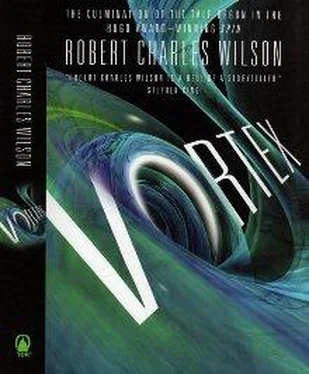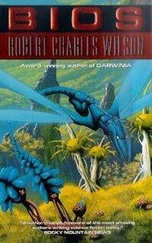I took an instinctive step backward. Then: “Look,” Oscar said in a hushed voice.
Something had landed on the arm of his protective suit. Oscar regarded it with a kind of terrified reverence. A snowflake, I thought at first. But on closer inspection it was more like a tiny crystalline butterfly—two pale and perfectly translucent wings beating over a body the size of a grain of rice.
Oscar lifted his arm so we could get a better look. The winged crystal had no eyes or segments or any other division in its body. It was just a curl of something like quartz, with legs (if you could call them that) as fine as eyelashes, which it used to cling to the fabric of Oscar’s suit. Its wings beat against the pressure of the wind. It looked as harmless as a piece of costume jewelry. The cloud descending the walls of the cube was composed of countless numbers of these things—millions, maybe billions of them.
Then, out along the periphery of the lights, a soldier began to scream.
The soldiers reacted quickly and professionally: they grabbed the portable lights and began waving the civilians back the way we had come. They did this despite the fact that hundreds or thousands of these tiny crystalline butterflies were swarming them, obscuring their vision and covering their clothing.
The butterflies were settling on me and Oscar, too, but not as aggressively. When I flicked my arm they fell away and dropped to the ground, inert. And when I brushed them away from Oscar they scattered from my hand.
Nevertheless we ran. Everyone was running now. The lamps the soldiers carried cast wheeling, hectic beams ahead of us. Through my earpiece I could hear barked commands and more screams, while the cloud of crystalline devices swirled around us like silent snow.
Other members of the expedition began to fall away behind us. I saw this in serial glances, looking back over my shoulder. Anyone who dropped to the ground was instantly swarmed, covered in a glassy drift, becoming a pale mound that heaved at first but quickly settled —I don’t have a better word for it. I began to understand that these men and women were dying.
The technicians died first. The soldiers wore heavier protective clothing, but even they were slowly being overwhelmed. The lamps when they dropped them raked light at static angles across the plain.
Twice I had to stop and brush Oscar free of the butterflies. I was too terrified to wonder why I was apparently immune to them. Oscar clearly wasn’t: his protective clothing was ragged now, torn in places by their small but razor-sharp legs, and some of those ragged patches were speckled with blood. I worried about his mask and oxygen supply and I tried to make sure I cleared the most vulnerable parts first. For a while we ran arm-in-arm, which seemed to keep the swarms at bay. All the panicked chatter and terrified screaming that had filled my earpiece slowly began to fade, and the final silence, when it came, was even more terrifying than the screams. I couldn’t say how long or how far we ran. We ran until we couldn’t run any more, until there was no sound but the roar of my own labored breath. Then I felt a sudden resistance, Oscar’s arm tugging me backward, and I thought, They got him, he’s dead weight —
But he wasn’t. When I turned to face him I found his suit was clean: there were no butterflies on him. His face through the moist blur of his mask was shocked but relatively calm. “Stop,” he gasped. “We’re out of range. We’re beyond the perimeter now. Please, stop. ”
I took a long look back.
We had come a fair distance. The abandoned lamps were still working, the Hypothetical machines plainly visible in a skewed crosshatching of artificial light. Nothing human was moving.
The wind blew grains of snow around our feet and the stars glittered overhead. We stood shivering, waiting for whatever might come out of the darkness after us—another attack, a straggling survivor. But there was no one, nothing.
Then, in quick succession, the distant lamps began to blink off.
* * *
We reached the aircraft guided by signal-finders built into our suits. It was a long walk but we were too shaken to talk much. Oscar eventually managed to establish voice contact with Vox Core, and he exchanged curt messages with managers and military personnel. Remote telemetry had broadcast most of what happened, and Vox was already attempting to analyze the data. “Probably,” he said at one point, “our presence triggered a defensive reflex of some kind.” Maybe so. But I wasn’t Voxish and I didn’t have to believe in the benevolence of the Hypotheticals—I didn’t have to make excuses for a senseless slaughter.
Our aircraft rested on the Antarctic plain like some incongruous deposition from a vanished glacier. I asked Oscar whether he would be able to pilot it back to Vox.
“Yes. Really, I just need to tell it to carry us home.”
“You sure? You’re bleeding, Oscar.”
He glanced down at his ravaged clothing. “Not badly,” he said.
Once we passed the airlock he stripped off his gear. His upper body had sustained a number of small cuts, none of them deep or life-threatening. He told me where to find a medical kit, and I smeared his wounds with something that stopped the bleeding.
A few of the tiny crystalline butterflies—dead or dormant—were still clinging to his discarded survival gear. Oscar emptied a ration box, tweezed one of the dead butterflies between his thumb and forefinger and dropped it inside. A sample for analysis, he said. Then we dumped the rest of our tattered clothes out the airlock.
* * *
“They didn’t touch you,” Oscar said, once we were aloft and the aircraft was following a programmed route to Vox.
What had been a crowded crew cabin on the flight out now seemed grimly and cavernously empty. The air, our bodies, even the fresh clothing we put on all reeked of hydrogen sulfide.
“No…”
“Because they recognized you.” His voice had been reduced to a shocked querulousness.
“I don’t know what that means, Oscar.”
“Obviously, they recognized you because you were Uptaken.”
“I don’t understand what happened any more than you do. But I’m not Isaac—I don’t have any Hypothetical biotech inside me.”
“Mr. Findley,” he said, “are you still denying it, even now? A human body doesn’t pass through a temporal Arch the way it might pass through one of the spatial Arches. We know this from many years of study. You weren’t preserved, like a frozen vegetable. In all likelihood you were re-created from stored information. The reconstruction may seem flawless to human eyes and human instruments. But they know you for one of their own.”
I was too exhausted to argue. Oscar was clinging to one of the few expectations this encounter had actually borne out: that the Hypotheticals had recognized me and singled me out for salvation. He believed he had survived because I was beside him, helping him. He imagined he had been saved, in other words, by a truculent and stupid demigod.
Chapter Fifteen
Sandra and Bose
Sandra arrived at the State Care intake facility at noon. The parking lot was silvered with heat mirages and the air was thick and oppressive, worse, if that was possible, than yesterday. The guard manning the desk at the entrance—his name was Teddy—sat basking in the breeze from a small rotary fan, but he stood up hastily when he recognized Sandra. “Dr. Cole! Hi! Hey, listen, I’m sorry, but I have instructions not to let you pass—”
“That’s okay, Teddy. Give Dr. Congreve a call and tell him I’m here and that I’d like to speak to him.”
Читать дальше












